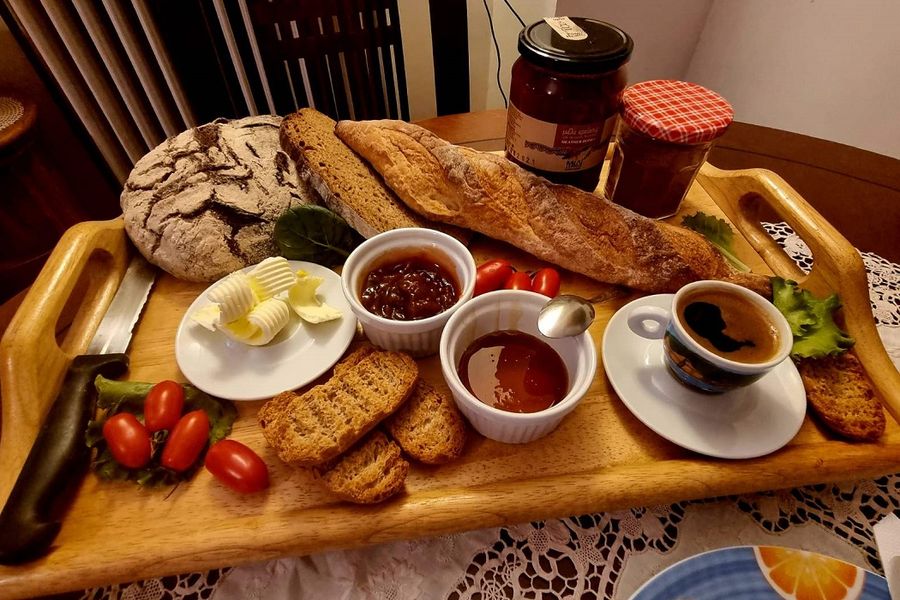When you think of Greece, your mind might wander to sun-soaked islands, turquoise waters, and ancient ruins glowing in the morning light. Many traditional Greek breakfast foods and practices can be traced back to ancient Greece, reflecting a rich historical significance that connects the modern table to its ancient roots. But before the day truly begins, there’s another kind of cultural treasure to discover — the traditional Greek breakfast. It’s not just a meal; it’s a small, daily celebration of simplicity, community, and flavour. Rooted in the rhythms of Mediterranean life, breakfast in Greece tells a story of regional traditions, local produce, and a philosophy of nourishment that balances pleasure with well-being.
A Simple Beginning: The Philosophy of Greek Mornings
Unlike the lavish breakfast buffets that often greet travellers in hotels today, the traditional Greek breakfast began humbly. For centuries, it was the meal of farmers, fishermen, and shepherds — people who needed energy to work under the sun yet preferred foods that were light, natural, and easy to digest. Early mornings often began with a cup of Greek coffee — strong, unfiltered, and served in a small cup, accompanied by something simple, such as a piece of bread, a handful of olives, or a slice of cheese. Even today, you might find yourself at a village café or on a shaded veranda overlooking the Aegean Sea, where locals eat their simple morning meal.
This minimalist start wasn’t just about convenience; it reflected the Greek attitude toward food and its role in daily life. Meals were meant to be genuine, seasonal, and lovingly prepared. Traditional Greek breakfasts often feature pies and dishes made with seasonal ingredients, celebrating the freshest local produce available at different times of the year. Even the humblest breakfast carried the essence of “philoxenia” — the Greek art of hospitality and care — whether shared at home, at a village café, or on a shaded veranda overlooking the Aegean Sea.
The Heart of the Morning: Bread, Olive Oil, and Honey
If there’s a holy trinity of Greek breakfast, it’s bread, olive oil, and honey. Freshly baked bread, or psomi, has long been the cornerstone of Greek life. Traditional Greek breakfasts feature a variety of breads, from sourdough loaves and sesame breads to sweet or enriched breads, each with distinct regional origins and cultural significance. In villages, bread is still often made in wood-fired ovens, using simple ingredients: flour, water, yeast, and salt. The local bakery remains a vital part of Greek communities, providing fresh bread and baked goods daily. Slices of warm bread are drizzled with extra virgin olive oil, sometimes sprinkled with oregano or sea salt, or served with a spoonful of golden Greek honey.
Greek honey deserves a special mention. It’s thicker and more aromatic than most kinds found elsewhere, thanks to the country’s diverse flora. Thyme, pine, and wildflower honeys are among the most prized varieties. Thyme honey from Crete or the Dodecanese islands, for instance, has an almost floral intensity that pairs perfectly with tangy strained Greek yoghurt — one of the breakfast’s defining elements today. Apples from regions like Zagora in Pelion are also a traditional breakfast fruit, whether eaten fresh or preserved for later in the year.
The Modern Classic: Greek Yoghurt and Its Companions
The most internationally recognised part of a Greek breakfast today is strained Greek yoghurt. Dense, creamy, and rich in protein, it’s made by draining whey from regular yoghurt, leaving behind a thick, luscious texture that feels indulgent yet nourishing. Locals enjoy it plain or topped with honey, walnuts, and sometimes fresh fruit, such as figs, peaches, or grapes, depending on the season.
Yoghurt isn’t just a modern health trend in Greece — it has deep roots in the countryside. For generations, it’s been a staple that bridges breakfast and dessert, a food associated with both comfort and vitality. Traditionally served in small ceramic bowls, its subtle tanginess complements the sweetness of honey or fruit, creating that classic balance of flavours found throughout Greek cuisine. In some mountain villages, Greek yoghurt is still prepared and served in traditional clay pots, which enhance its taste and authenticity.
Cheese, Olives, and Savoury Pleasures
For those who prefer savoury beginnings, Greece offers plenty of choices. A proper Greek breakfast often features feta cheese — crumbly, salty, and perfectly paired with ripe tomatoes or cucumbers. In some regions, you might find grilled halloumi, graviera, or mizithra, each offering a different texture and flavour profile. Savoury breakfast pies or pastries may also include meat fillings, providing a heartier option alongside cheese or vegetable-based varieties.
Cheese is usually accompanied by a few Kalamata olives, a drizzle of olive oil, and perhaps some fresh herbs like oregano or basil. Simplicity is deceptive — every ingredient carries centuries of tradition and a sense of place. Eating this way connects you to the land, to small family farms, and to the Mediterranean sun that nurtures every olive and grapevine.
Eggs on the Greek Table: Morning Classics
No traditional Greek breakfast table is complete without the humble egg, a true morning classic cherished by Greeks across the country. Eggs are enjoyed in a variety of ways, from simply boiled or fried to more elaborate dishes that showcase the vibrant flavours of Greece. One beloved breakfast dish is the Greek-Style Omelette, where fluffy eggs are cooked with creamy feta cheese, sweet onions, juicy tomatoes, and briny black olives. Each bite is a celebration of fresh, local ingredients, often finished with a drizzle of golden olive oil.
Another staple is Strapatsada, a rustic scramble of eggs sautéed with ripe tomatoes, onions, and a generous sprinkle of feta cheese. Sautéed veggies add colour and depth, while a touch of olive oil brings everything together. These egg dishes are typically served with slices of crusty bread, a wedge of cheese pie or spinach pie, and a handful of olives, making for a hearty and satisfying breakfast. Whether enjoyed at home or in a bustling village café, eggs cooked the Greek way are a delicious reminder of the country’s love for simple, nourishing food.
Pies and Pastries: A Taste of the Countryside
Another beloved part of Greek breakfast culture is the pita — not the flatbread found elsewhere, but a variety of savoury pies made with flaky phyllo dough. The most famous is the spanakopita, a spinach pie enriched with feta and herbs. Traditional Greek cooking methods for these pies involve layering thin sheets of phyllo and using fresh, local ingredients, preserving the authenticity of Greek cuisine. Others include tyropita (cheese pie), hortopita (wild greens pie), or bougatsa, a custard-filled phyllo pastry dusted with cinnamon and sugar, often enjoyed with a hot coffee. Traditional Greek recipes for these pies typically use whole eggs rather than just egg whites, resulting in a richer flavour and texture. Try a recipe for one of these delicious pies at home to experience authentic Greek flavours.
In northern Greece, especially in Thessaloniki, bougatsa is an institution. Locals line up early in the morning to buy it fresh from bakeries, where it’s served warm and cut into small squares. Each region adds its own twist: on festival days, special pies and breads are prepared and shared as part of the celebration. In Crete, pies may include local greens and mizithra cheese, while on the islands, you’ll find versions sweetened with honey or grape syrup. After enjoying sweet pies, many Greeks also savour rice pudding (rizogalo), a traditional breakfast or dessert made with rice, milk, and cinnamon. Nuts, often found in pastries, are also a popular snack in Greek breakfast culture. Spanakopita, with its savoury filling and flaky crust, is a tasty breakfast option. In some regions, pastries or cold cuts are marinated or flavoured with wine, especially in certain local traditions. Soup, such as avgolemono, is also enjoyed as a comforting breakfast dish in some parts of Greece.
Sweet Mornings: Desserts and Treats
For those with a sweet tooth, Greek mornings offer a tempting array of traditional treats that make breakfast feel like a celebration. Bougatsa, a warm semolina custard pie wrapped in delicate phyllo pastry and dusted with cinnamon, is a favourite in bakeries across Greece. Another irresistible delight is Loukoumades—fluffy, golden dough balls fried to perfection, then drizzled with fragrant honey and sprinkled with cinnamon and crushed nuts. These sweet bites are often enjoyed with a cup of strong coffee, making for a truly delicious start to the day. Visit here
Greek yoghurt also takes centre stage at the breakfast table, served thick and creamy, topped with a swirl of honey, a handful of walnuts or almonds, and slices of fresh seasonal fruit. Sesame seeds add a nutty crunch to many Greek pastries and biscuits, infusing each bite with tradition and flavour. Whether you’re savouring a sweet pie, a bowl of yoghurt, or a freshly baked biscuit, Greek breakfasts prove that mornings can be both nourishing and indulgent. Visit here
Coffee, Always Coffee
No Greek morning is complete without coffee. Greek coffee, brewed slowly in a small briki pot and served in a demitasse cup, is strong and thick, with a layer of foam on top called kaimaki. It’s meant to be sipped slowly, often accompanied by conversation — the true essence of a Greek morning ritual. Alongside Greek coffee, Greeks drink a variety of beverages at breakfast, including herbal teas, fresh fruit juices, and other teas.
You might also encounter frappé, Greece’s iconic iced coffee made with instant coffee, water, sugar, and sometimes milk. Born in Thessaloniki in the 1950s, frappé became the country’s unofficial summer drink. In recent years, it has been joined by the trendier freddo espresso and freddo cappuccino, both cold versions of classic Italian coffees, prepared with the unmistakable Greek flair for freshness and ease. Herbal teas such as Greek mountain tea, chamomile, and Louiza are also popular, as are international varieties like English Breakfast tea, reflecting the diverse tea culture enjoyed during Greek breakfasts.
Regional Specialities: From the Islands to the Mainland
Each corner of Greece has its own breakfast character. On Crete, mornings might start with dakos — a barley rusk topped with grated tomato, olive oil, feta or mizithra, and oregano. In Epirus, you’ll find hearty pitas made with hand-rolled dough and local cheeses on the islands, where the air smells of sea and herbs. Breakfast might include fresh fruit, yoghurt, and local jams made from figs or quince.
In Pelion, a mountainous region overlooking the Aegean, breakfast often features spoon sweets — fruits preserved in syrup, served by the spoonful with coffee or yoghurt. These sweet preserves, known as glyka tou koutaliou, represent the soul of Greek hospitality: offering something homemade and heartfelt to every guest who visits.
Health and Balance: The Mediterranean Way
What makes the traditional Greek breakfast particularly special is its natural balance. Long before “Mediterranean diet” became a global term, Greeks were living it daily — consuming foods rich in fibre, healthy fats, and natural sugars, with minimal processing. Olive oil provides monounsaturated fats; yoghurt and cheese offer protein and calcium; fruits and honey add antioxidants and natural sweetness.
Visit beekeepers here
Even pastries and bread, when made with whole grains and local ingredients, fit into a lifestyle that emphasises moderation, not deprivation. Meals are social events, meant to be savoured, not rushed — a philosophy that contributes not only to physical health but also to mental well-being.
Bringing Greece Home: Tips for Your Own Greek Breakfast
Dreaming of a typical Greek breakfast in your own kitchen? It’s easier than you think to bring the flavours of Greece home. Start with the essentials: creamy feta cheese, plump olives, and a selection of fresh vegetables, such as tomatoes, cucumbers, and onions. Don’t forget to reach for classic Greek herbs such as oregano and thyme, which add a burst of Mediterranean aroma to any dish.
For an authentic taste of Greece, try your hand at a traditional dish like Strapatsada or a Greek-Style Omelette, both brimming with eggs, feta, and vibrant veggies. Pair your breakfast with a cup of strong Greek coffee or a glass of freshly squeezed orange juice for an authentic touch. The key is to use fresh, high-quality ingredients and to cook with a spirit of simplicity and joy. Next time you’re planning breakfast, let Greek cuisine inspire you—your taste buds and your family will love the delicious results.
The Spirit of the Greek Breakfast
To start your day like a local in Greece is to embrace a slower rhythm. It means sitting down with a simple spread — a bowl of yoghurt, a drizzle of honey, a slice of bread, a few olives, a cup of coffee — and allowing the morning light to unfold. It’s about appreciating the freshness of local ingredients, the warmth of community, and the quiet joy of beginning the day with intention.
Whether you’re on a shaded terrace in Santorini, a village café in Crete, or your own kitchen miles away, you can capture the spirit of Greece every morning. All it takes is a few essential ingredients, a moment of calm, and an appreciation for the beauty of simplicity.
Because in Greece, breakfast isn’t just the first meal of the day — it’s an invitation to savour life itself.




